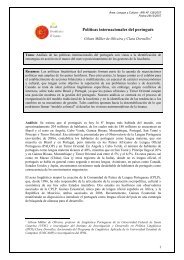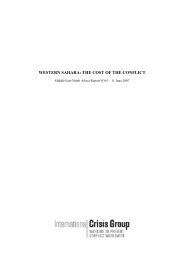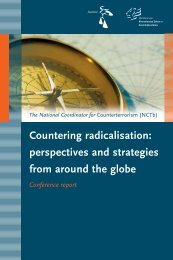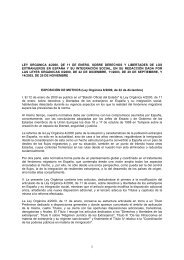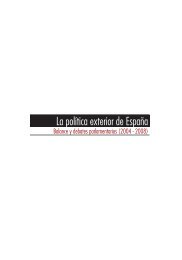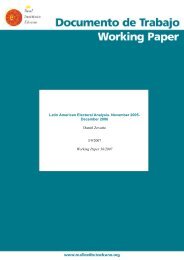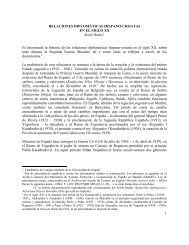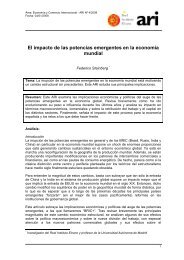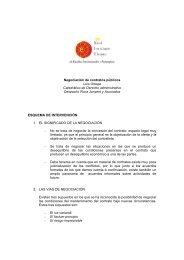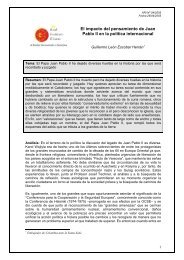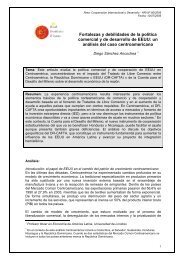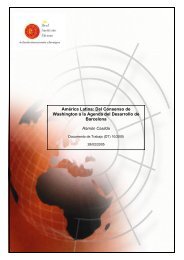Spain and the United States - Real Instituto Elcano
Spain and the United States - Real Instituto Elcano
Spain and the United States - Real Instituto Elcano
Create successful ePaper yourself
Turn your PDF publications into a flip-book with our unique Google optimized e-Paper software.
OVERVIEW 19<br />
Later, <strong>the</strong> runway at Rota became a valuable asset to <strong>the</strong> US Air Force when<br />
Washington lost its bases in Morocco in 1963. The runway was leng<strong>the</strong>ned so<br />
that it could h<strong>and</strong>le l<strong>and</strong>ings of B-52 bombers <strong>and</strong> KC-135 tankers in<br />
emergency situations. Rota became, <strong>and</strong> still is, one of <strong>the</strong> three largest <strong>and</strong><br />
most important US bases outside continental America for strategic deterrence.<br />
The US-Spanish relationship is <strong>the</strong> longest-st<strong>and</strong>ing association with a<br />
foreign country in Spanish contemporary history. According to Angel Viñas,<br />
<strong>the</strong> leading Spanish historian on <strong>the</strong> subject, “<strong>Spain</strong> had changed orientations<br />
in its foreign policy posture (leaning ei<strong>the</strong>r toward France or <strong>the</strong> UK, whose<br />
actions usually restrained <strong>the</strong> Spanish margin for manoeuvre, or briefly to<br />
Germany) but in no case did such orientation lead to a permanent alignment.”<br />
That changed with <strong>the</strong> bases agreement.<br />
In <strong>the</strong> domestic arena, Viñas lists five main consequences of <strong>the</strong> Pact<br />
of Madrid:<br />
• The agreement was essential in engineering a pervasive feeling of<br />
security in <strong>the</strong> dictatorship, which had been hotly contested in <strong>the</strong><br />
immediate post world war period.<br />
• It became <strong>the</strong> mainstay of what might be called a “Franco model of<br />
deterrence”. Externally, it was applied to North African security<br />
scenarios. Domestically, it was applied to <strong>the</strong> “internal enemy” (<strong>the</strong><br />
vanquished in <strong>the</strong> Civil War <strong>and</strong> all those who might actively oppose <strong>the</strong><br />
dictatorship). This was not lost among US decision makers. What <strong>Spain</strong><br />
needed (<strong>and</strong> got), said President Eisenhower, was a “good little army”<br />
that could keep <strong>the</strong> country stable.<br />
• It led to <strong>the</strong> introduction of modern approaches to economic management<br />
<strong>and</strong> opened <strong>the</strong> door to <strong>Spain</strong> becoming a member of <strong>the</strong> Bretton Woods<br />
institutions (International Monetary Fund <strong>and</strong> World Bank). Without this,<br />
<strong>Spain</strong> would not have established an economy linked to <strong>the</strong> global one.<br />
• It gave <strong>Spain</strong> respectability <strong>and</strong> led to visits by Presidents Eisenhower,<br />
Nixon <strong>and</strong> Ford (no European prime minister or head of state met Franco<br />
apart from Portugal’s dictator, Oliveira Salazar). Fur<strong>the</strong>rmore, <strong>the</strong> US<br />
government did not interfere at all in Spanish domestic affairs even to <strong>the</strong><br />
extent of not giving any kind of moral support to <strong>the</strong> political opposition<br />
during Franco’s last years.<br />
• The US connection produced a strong anti-US sentiment among <strong>the</strong><br />
Spanish left, which, combined (for very different reasons) with <strong>the</strong>



